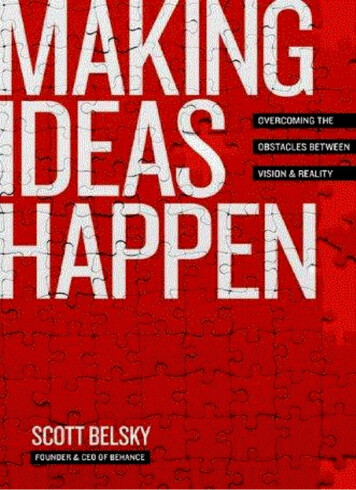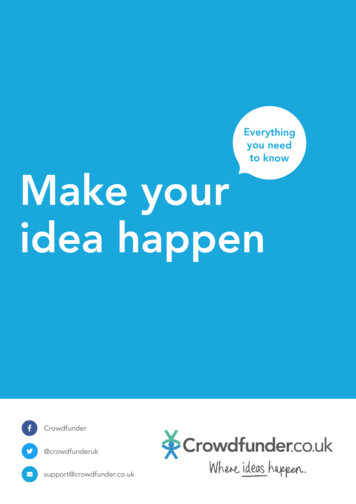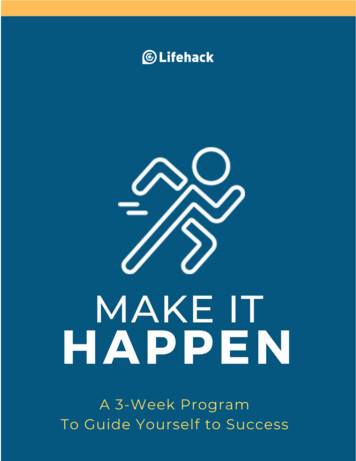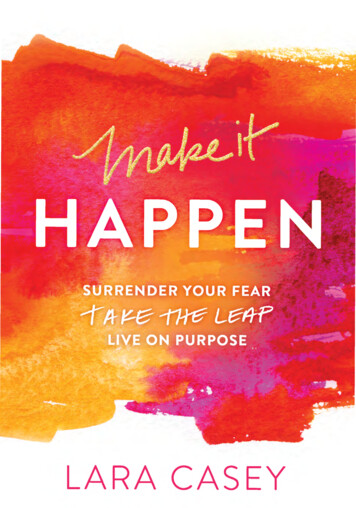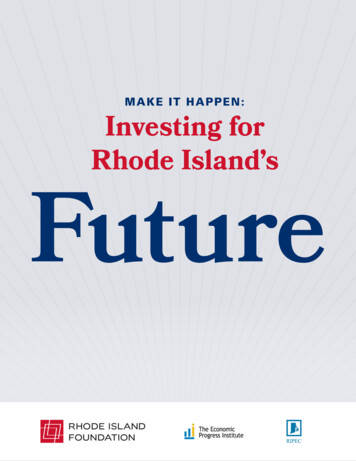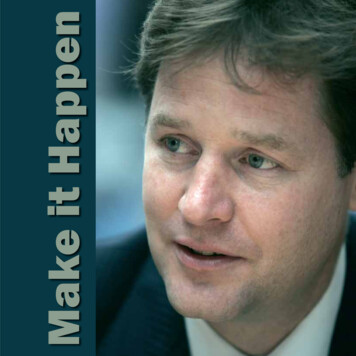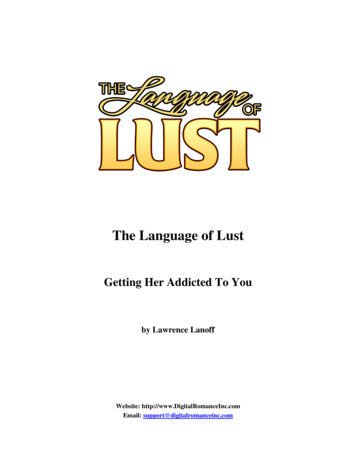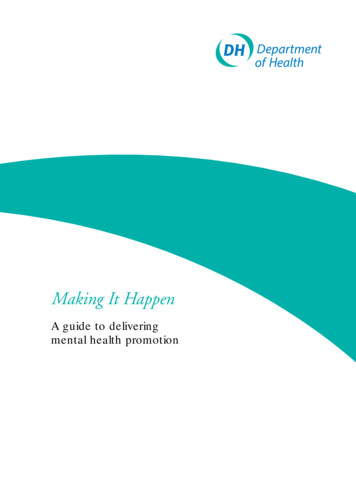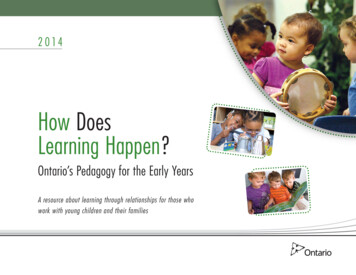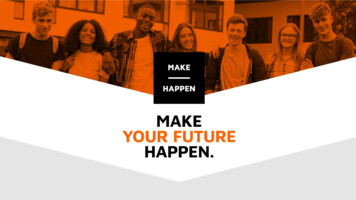
Transcription
Introduction to Make Happen Make Happen is the regional Uni Connectprogramme funded by Office for Students. In partnership with schools, colleges anduniversities. We work with young people in years 9to 13 to help inform and inspire interest in HigherEducation.
Introduction to Make HappenPhase two of the Uni Connect programme aims to: Reduce the gap in higher education participation between themost and least represented groupsSupport young people to make well-informed decisions abouttheir future educationSupport effective and impactful local collaboration by highereducation providers working together with schools, colleges,employers and other partnersContribute to a stronger evidence base around ‘what works’ inhigher education outreach and strengthen evaluation practicein the sector
Outreach HubThe 29 local partnerships have established outreach hubs that coverevery local authority in England.The aim of the Outreach Hub is to: Help teachers and advisers find out about the outreach activityavailable in the area Support schools and colleges in areas of low participation toaccess higher education outreach Provide a platform for other local collaborative activity
Children from Military Families
Children from Military Families Agenda1.2.3.4.5.Barriers to HE ProgressionSCiP Alliance East Anglia HubSCiP Alliance Thriving Lives ToolkitMake Happen SupportGroup DiscussionFour out of ten service children who have the ability to progress into higher educationare unlikely to do so.(McCullouch and Hall, 2016)
Children from Military FamiliesThe DfE introduced the Service pupil premium (SPP) in 2011 and linksto Autumn Term school census. Schools with students from Reception to Year 11 can receive 310per child who meets the eligibility criteriaSPP is there to provide pastoral support, mentoring etcSPP should not subsidise routine school activityReviewed in Ofsted inspectionsMake Happen is currently part of Post 16 research project with the SCiPAlliance.8
Barriers to HE progression
Barriers to HE progressionDisrupted education Differences in curriculum provision Lack of communication between schools– exam students– additional learning needs Restricted course choices Less participation in extra-curricular activities
Barriers to HE progressionWellbeing issues Disruption to routines and family dynamics Friendships and bullyingNegative impact on ability to study and potential emotional andbehavioural difficulties.
Barriers to HE progressionChildren having caring responsibilities Less likely to be identified Less likely to receive support
SCiP Alliance East Anglia Hub
SCiP Alliance East Anglia HubThe SCiP Alliance East Anglia Hub was launched on Monday 19th April. The aimof a Hub is to bring people together to support practitioners and professionals tochampion the progression of children and young people from Armed Forcesfamilies and ensure the best outcomes. Through connecting professionals inorder to ensure the success of the Armed Forces Covenant, a “promise from thenation that those who serve or have served, and their families, are treated fairly”Bringing together a partnership of stakeholders, including HEIs, Uni Connects,Armed Forces Family Federations, LEAs and charities, the hub aims to enablenew and better collaborations, facilitate communication, build capacity, reach outto new stakeholders, communicate with, contribute to and draw from the SCiPAlliance Practice Group and Strategy Board. Finally, to share and respondcollectively to effective practice, challenges, ideas, priorities and questions.
SCiP Alliance Thriving LivesToolkit
The Thriving Lives Toolkit A resource produced by the SCiP Alliance to help professionalsbetter connect with each other, evidence and available support Research conducted by– Literature review– Survey of 479 schools– In depth study of schools known for service children support. Multi-case study looking at service children, senior leaders,teachers and support staff with a mix of primary andsecondary and a varying proportion of service children.17
Thriving Lives Toolkit Findings of research developed into toolkit by– In collaboration with: The toolkit was piloted in a variety of schools in 202018
Results of 2020 pilot study. All participants recommended that other schools educating Service children use thistool to consider their support for their Service children. Schools suggested that you schedule time for it on a regular basis, using it as the basisof diagnostic and planning activities. Many schools highlighted its usefulness in developing governance documents andstrategies. Schools suggest that you use the toolkit not only to record your own thoughts, but as atool for communication and collaboration within the school and in conversations withothers, such as local authorities or inspection teams. Schools identified the Toolkit’s potential to provide a mechanism for schools to sharepractice, to develop shared activity or to collaborate on funding bids.19
How the toolkit works
How the Toolkit works21
22
How the toolkit works
t25
Make Happen
Make Happen workshops available for Make HappenSchools/Colleges ApprenticeshipsFinancial EducationStudent FinanceCareersUniversity lifeTransferable skillsPresentation skillsPersonal Statements
Make Happen workshops available for Make HappenSchools/Colleges Intro to UCAS You and your Future CVs and Covering lettersAvailable for year 9s to year 13s, more info on request.28
Make Happen Taster sessions available through yourOutreach Officer – Years 11 to 13 ApprenticeshipsBiology Taster sessionGeneral University taster sessionPhilosophy subject tasterPhysics virtual taster sessionHistory subject tasterNeuroscience subject tasterSociology subject taster
Other sessions available through Make Happen Student life talks. Different University students talking aboutdifferent courses and different experiences relating to theirStudent life. Workplace Wednesdays. Talking to employers and employeesabout their career journeys and their current roles. From being aScientific Publisher to a TV Sport Producer30
Current Make Happen sessions available for self sign up Getting to grips with Apprenticeships for years 9 to 13,18/5/2021 6pm Bridging the gap for year 11 students, go on our website tofollow the links. Follow MAKEHAPPEN.ORG for up to date events and news
Discussion
Discussion Questions1. Do you know who your students from military families are?2. What support already exists for them in your school/college?3. Are you aware of any additional local barriers which may stopyour students from military families progressing to HE?4. What support would be useful to you that Make Happen couldprovide?
Introduction to Make Happen Make Happen is the regional Uni Connect programme funded by Office for Students. In partnership with schools, colleges and universities. We work with young people in years 9 to 13
